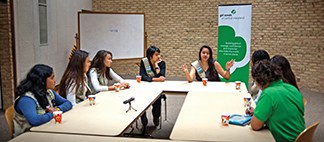STORY BY Danita Terry & Martha Thomas PHOTOGRAPHY BY André Chung
Girl Scouts open up about friends, career aspirations and the changing roles of women.
Each of you has displayed leadership qualities. How do you define leadership?
Helen: I think leaders are people who can get things done and bring people together.
Marie S:The qualities of being a leader are having time management and scheduling skills, speaking out for yourself and realizing that you have to listen to volunteers or people helping you.
Malerie: At our school, a catchphrase is initiative – it’s also about taking ownership of your actions.
Hannah: We’re all leaders. Being Girl Scouts involves so many things that require leadership skills. So I think all of us here are leaders.
Some of you followed the 2012 election. How did you feel about some of the issues discussed
about women?
Marie S: I was watching Obama speak during the Democratic convention about how his grandmother was training all these men – they were actually moving up(ahead of her) in the banking industry. I thought that it was so unfair! Hearing him talk about a personal problem like that, with his own grandmother, illustrated a problem that so many women still have, I guess they call it the glass ceiling. I want women to change that – and men to realize that we can rise above that glass ceiling.
Maria M: I noticed the absence of women shown in leadership positions in government and society. If we had strongwomen leaders, other women could look up to them and say, we can do this, this is our potential. We know that women have the ability – we’ve seen it in Girl Scouts.
Chiazam: I feel like women are still mistreated, and that discourages some women – but also encourages some.
Malerie: As women we get a lot of perks. If I walk out the door and there’s a man standing there, yeah, he’ll open the door for me. But for every paycheck, if a man and a woman are doing the same job, men make 17 cents more on the dollar. It adds up. If that doesn’t light a fire under your butt, I don’t know what will.
Helen: I think having more women leaders in Congress is a big step. When my A. P. (advanced placement) government teacher was a kid there were only two female senators. It’s amazing that we have 20 now.
Marie S: Women have trouble taking on leadership roles because they have to take care of the house and the children. People should teach girls and boys that they both need to help out around the house. It would take off pressure on women who have jobs and kids too. If we had more equal housework, equal roles in the house, that would help, because women could go further in their careers.
If you plan to work outside of the home, do you think it will be difficult?
Marie S: When I get a job, find a husband and have kids, a long way down the road, I’m going to make my husband help out. That’s just how it’s going to be.
Hannah: I personally absolutely do want to work, I don’t want to be dependent on one person. I have a great family and friends who will help me along the way.
Maria M: I don’t want to have to depend on my husband to be the breadwinner. On TV, the mom is always cleaning and cooking and driving the kids around. That’s not the way it has to be.
Malerie: In our family, we’re steering away from the whole stereotypical mom’s in the kitchen, dad comes in, hi sweetie, I’m home. It doesn’t have to be opposite either. You have to try compromise.
Someone mentioned the roles of women on TV. What do you all think about how women and girls are portrayed in the media?
Malerie: It depends on what you watch. On TV, you see dumb blondes, the nerdy girl, the pretty girl. They are all stereotypes of women. Not the greatest.
Marie S: I see more commercials treating women like sex objects. Victoria’s Secret affects girls’ body images. They start thinking, maybe I should be skinny, maybe I should wear makeup. TV commercials should show more women who are respected. We need to stand up and say this is wrong; you’re affecting how girls think of themselves.
Helen: I saw a Victoria’s Secret commercial, and I just wanted to look away. It’s really demoralizing, it’s not cool. Women with Barbie doll figures – even the Barbie dolls themselves – you can’t achieve that. You’d have to take out your liver. I read that somewhere.
Maria M: They Photoshop the magazines too. We’re like, oh, her eyes are perfect, she’s so skinny, she has clear skin. I saw an article where they showed the photo-shopped picture and the real thing. There was a wrinkle in her tummy that they took out. She had some acne on her skin.
Malerie: Girls, we have to stop being so impressionable.
What does femininity mean to you, and do you think girls are concerned with acting, being, looking feminine?
Marie: People need to say, what do I think being a woman or a girl is? What am I comfortable with? They need to look away from people who say you should have long hair, super nice clothes. You need to turn to yourself and decide what you think.
Maria M: One thing that really annoys me is hearing “you should act like a girl.” I dislike when people say that. There shouldn’t be a solid definition of what femininity is.
Cierra: To be feminine is your own choice. But before you even go into a store to buy clothes, they have mannequins, so you say, ‘Hmm, is that what I’m supposed to wear?’
Malerie: Men and women can be feminine. Maybe a guy leaves the room, and someone will say, “he’s so feminine.” What are they saying? There are so many different interpretations of femininity
Is there a difference between being a lady and being a woman?
Cierra: I see a woman as being not a girl, grown-up, independent. A lady is proper, sitting with her legs crossed, elbows off the table. My grandma is always like, ‘You need to be more of a lady.’
Chiazam: When I think of lady, I think of manners, being respectful. For woman, I think of someone who is independent and mature, someone who knows who they are.
Do you think it’s possible to be a lady and a woman?
All: YES.
Helen: In some situations, you do have to have the right manners. You want people to respect you. Being a lady is being polite, sometimes not voicing what you think is the right thing.
Malerie: I’m sorry, I have to disagree. Right now, I’m acting like a lady, but I’m also speaking my mind, getting my voice heard.
Chiazam: In some situations, part of being a woman is being a lady; you have to be respectful. You have to not be stupid. It’s part of how to earn respect.
We’ve talked about ladies, women, girls. Is being emotional something only women, girls or ladies can do?
Maria M: People have this misconception that only women are emotional. I don’t think they realize that men have the same feelings. Say you like someone, girls will talk to their friends about it nonstop. If guys feel the same way about a girl, they might not be as open about it.
Chiazam: I don’t think it’s wrong for guys to be emotional. When my grandmother passed, I saw my big cousin cry. He’s an ex-football player. I saw him cry and it made me cry.
There have been great efforts to get girls involved in courses and careers in STEM (science, technology, engineering and math). They say it’s not an area of interest to girls, because it’s HARD.
Maria M: It’s important for girls to know that we can do math problems just as well as boys. We can solve problems in the lab. We should just go out and prove them wrong.
Helen: I think the main reason girls don’t want to go into STEM fields, they think of it as a boring place where you just do math. You have to teach them what STEM can do, how much fun it can be.
Do you have one best friend or many? Are your Facebook friends your real friends?
Maria M: I’m a very social person. Most of the girls in my high school are in these cliques. The popular girls, the athletic girls, the really smart girls, the quiet girls. I’m friends with everyone. Hearing what one group has to say about another, I realize there are a lot of stereotypes. The quote, “unpopular” girls, think the popular girls are really stuck up. Some girls don’t take the time to get to know people outside of their group. As for Facebook friends, all of us have a bunch of friends on Facebook that we don’t even talk to.
Helen: High school is not really a pyramid any more with the popular kids at the top. That’s how it was in middle school. In high school, you can hang out with whoever you want. High school is more about quality over quantity. You can have only one friend and have the best time, or you can have a bajillion friends and have the worst time.
Chiazam: In high school you meet new friends – one of my best friends from middle school I don’t even see anymore. High school is a chance to branch out.
Hannah: It’s hard to get close to 100 people. I think a core group of friends you can be close to is good.
Is there a role model in your life?
Helen: It’s definitely my family. Seeing my parents act on their values and knowing what they expect from me makes me want to do good things and be a good person.
Marie: I look up to Barbara Mikulski and all the women in Congress. We were on Capitol Hill and learned that all the women in Congress are either past Girl Scouts or honorary Girl Scouts. I’m doing something that so many women in the world and in the U.S. have been part of.
Malerie: My mom. If I’m complaining, she’ll say, why don’t you stop talking and do something about it? She’ll talk with me and lead me through it. It teaches me what it’s like to be an adult and stand up for something.
Cierra: My parents are my role models. My dad tells me do as well as you can. Nobody can tell you that you can’t do something. My mom, even though she passed away, always told me to reach for the stars.
Chiazam: My whole family. I grew up in a very traditional household. My parents are really big on manners. That has really influenced me.
Hannah: My mom is my role model, I really look up to her. Her whole life she’s worked really hard. Now she has a business, but she still has time for me and my brother. *




